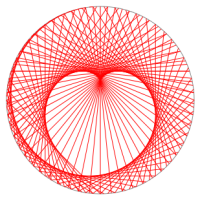Leetcode Contest 38
这次比赛我表现得比较差,只能做出第一题和第三题。第四题比赛结束之后很快也写出来了,而第二题确实花了我一个多小时才能想出来。
第一题Maximum Product of Three Numbers
先将数组排序,那么最大值必然在下面四种情况中:
- 第一个数 X 第二个数 X 第三个数
- 倒数第一个数 X 倒数第二个数 X 倒数第三个数
- 第一个数 X 倒数第一个数 X 倒数第二个数
- 第一个数 X 第二个数 X 倒数第一个数
class Solution(object):
def maximumProduct(self, nums):
"""
:type nums: List[int]
:rtype: int
"""
nums.sort()
return max(nums[0]*nums[1]*nums[2],
nums[-1]*nums[-2]*nums[-3],
nums[0]*nums[-1]*nums[-2],
nums[0]*nums[1]*nums[-1])
第二题Course Schedule III
首先分析一下在什么条件下我们能上[(t1, d1), ..., (tm, dm)]中的所有课。不妨假设
那么我们要保证第k门课的完成时间不晚于第dk天,所以对任意的k=1, 2, ..., m,我们都有
根据以上的分析,我构造了如下的贪心算法。
首先要对所有课程按照d从小到大排序。假设知道课程1到课程m一共m门课时的最优解,对于新加入的第m+1门课程,我按照以下规则处理:如果之前最优解的总时长加上第m+1门课的时长还不晚于第m+1门的截止时间,我们就直接将第m+1门课加入最优解中。也就是说如果我们能继续上第m+1门课程的话就直接上。如果不能直接上的话,我们找出之前最优解中最耗时间的课程,如果这门课程比第m+1门课更耗时间,那么我们就将它换成第m+1门课。虽然我们没有增加最优解的课程数目,但是替换课程可以使得最优解的总时长变短。
因为希望能快速找出特定变化集合的最大值,所以实现中我用到了堆。算法的时间复杂度为O(nlog n)。
from heapq import heappush, heappop
class Solution(object):
def scheduleCourse(self, courses):
"""
:type courses: List[List[int]]
:rtype: int
"""
courses.sort(key=lambda c: c[1])
h = []
s = courses[0][0]
heappush(h, -s)
for t, d in courses[1:]:
if s+t<=d:
heappush(h, -t)
s += t
elif h[0]+t<0:
s += h[0]+t
heappop(h)
heappush(h, -t)
return len(h)
第三题K Inverse Pairs Array
令f(i, j)表示由1到i构成并恰好有j个逆对的数组的个数。对于由1到i构成的数组,如果第1位的数为x,那么我们知道跟x构成逆对的数字有x-1个。而x的取值可能为1,2,...,i,所以我们有关于f(i, j)的如下公式。
如果\(j=0\),\(f(i, 0)=1\).
如果\(1 \le j \le i-1\),
如果\(i \le j \le k\),
如果我们直接根据上面的递归公式实现,那么得到的算法时间复杂度是O(n3)(假设n和k很接近)。因为n最大可能是1000,所以是会超时的。我们需要更好的公式。
观察上面的公式,我们不难发现f(i, j)与f(i, j-1)的递归公式相差很少的。事实上,通过分析f(i, j)-f(i, j-1),我们可以得到以下公式。
如果\(j=0\),\(f(i, 0)=1\).
如果\(1 \le j \le i-1\),
如果\(i \le j \le k\),
这个更好的递归公式能给我们一个O(n2)的算法。不过这个递归公式有点瑕疵,因为给定i个数字,逆对的个数最多是i(i-1)/2。因此我们还要根据j和i(i-1)/2的大小关系做出细微的调整。
class Solution(object):
def kInversePairs(self, n, k):
"""
:type n: int
:type k: int
:rtype: int
"""
M = 10**9+7
f = [[0]*(k+1) for _ in xrange(n+1)]
for i in xrange(1, n+1):
f[i][0] = 1
c = min(k, i*(i-1)/2)
for j in xrange(1, min(i, c+1)):
f[i][j] = (f[i][j-1]+f[i-1][j]) % M
for j in xrange(i, c+1):
f[i][j] = (f[i][j-1]+f[i-1][j]-f[i-1][j-i]) % M
return f[n][k]
第四题Design Excel Sum Formula
这题比我想象中简单,只是题目比较长而已。这个问题的难度我觉得在set的设计上。每次设置一个值时,我们都要正确的更新整个表中的值。我用了带记忆的深度搜索实现更新的。
class Excel(object):
def __init__(self, H,W):
"""
:type H: int
:type W: str
"""
self.cell = {}
self.sums = {}
for i in xrange(1, H+1):
for j in xrange(ord(W)-ord('A')):
self.cell[i, j] = 0
self.sums[i, j] = []
def set(self, r, c, v):
"""
:type r: int
:type c: str
:type v: int
:rtype: void
"""
self.cell[r, ord(c)-ord('A')] = v
self.sums[r, ord(c)-ord('A')] = []
seen = set()
def dfs(r, c):
if not self.sums[r, c] or (r, c) in seen:
return self.cell[r, c]
ans = 0
for s in self.sums[r, c]:
if ':' not in s:
ans += dfs(int(s[1:]), ord(s[0])-ord('A'))
else:
s = s.split(':')
rb, cb = int(s[0][1:]), ord(s[0][0])-ord('A')
re, ce = int(s[1][1:]), ord(s[1][0])-ord('A')
for i in xrange(rb, re+1):
for j in xrange(cb, ce+1):
ans += dfs(i, j)
seen.add((r, c))
self.cell[r, c] = ans
return ans
for r, c in self.cell.keys():
dfs(r, c)
def get(self, r, c):
"""
:type r: int
:type c: str
:rtype: int
"""
return self.cell[r, ord(c)-ord('A')]
def sum(self, r, c, strs):
"""
:type r: int
:type c: str
:type strs: List[str]
:rtype: int
"""
c = ord(c) - ord('A')
self.sums[r, c] = strs
ans = 0
for s in strs:
if ':' not in s:
ans += self.cell[int(s[1:]), ord(s[0])-ord('A')]
else:
s = s.split(':')
rb, cb = int(s[0][1:]), ord(s[0][0])-ord('A')
re, ce = int(s[1][1:]), ord(s[1][0])-ord('A')
for i in xrange(rb, re+1):
for j in xrange(cb, ce+1):
ans += self.cell[i, j]
self.cell[r, c] = ans
return ans
# Your Excel object will be instantiated and called as such:
# obj = Excel(H, W)
# obj.set(r,c,v)
# param_2 = obj.get(r,c)
# param_3 = obj.sum(r,c,strs)
